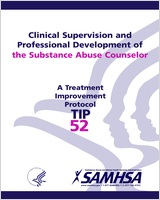This is an open-access report distributed under the terms of the Creative Commons Public Domain License. You can copy, modify, distribute and perform the work, even for commercial purposes, all without asking permission.
NCBI Bookshelf. A service of the National Library of Medicine, National Institutes of Health.
Contents
- Consensus Panel
- What Is a TIP?
- Foreword
- How This TIP Is Organized
- Part 1 Clinical Supervision and Professional Development of the Substance Abuse Counselor
- Chapter 1
- Introduction
- Central Principles of Clinical Supervision
- Guidelines for New Supervisors
- Models of Clinical Supervision
- Developmental Stages of Counselors
- Developmental Stages of Supervisors
- Cultural and Contextual Factors
- Ethical and Legal Issues
- Monitoring Performance
- Methods of Observation
- Practical Issues in Clinical Supervision
- Methods and Techniques of Clinical Supervision
- Administrative Supervision
- Resources
- Chapter 2
- Introduction
- Vignette 1—Establishing a New Approach for Clinical Supervision
- Vignette 2—Defining and Building the Supervisory Alliance
- Vignette 3—Addressing Ethical Standards
- Vignette 4—Implementing an Evidence-Based Practice
- Vignette 5—Maintaining Focus on Job Performance
- Vignette 6—Promoting a Counselor From Within
- Vignette 7—Mentoring a Successor
- Vignette 8—Making the Case for Clinical Supervision to Administrators
- Chapter 1
- Part 2: A Guide for Administrators
- Chapter 1
- Benefits and Rationale
- Key Issues for Administrators in Clinical Supervision
- Administrative and Clinical Supervision
- Legal and Ethical Issues for Administrators
- Diversity and Cultural Competence
- Developing a Model for Clinical Supervision
- Implementing a Clinical Supervision Program
- Professional Development of Supervisors
- Chapter 2
- Chapter 1
- Part 3: A Review of the Literature
- Section 1: A Review of the Literature
- Overview of the TIP
- TIP Organization
- Introduction
- Definitions of Clinical Supervision
- Unique Issues in Supervision for Substance Abuse Counselors
- The Current Status of Clinical Supervision for Substance Abuse Counselors
- Models of Clinical Supervision
- Modalities of Supervision
- Supervisory Styles and Contributing Factors
- Cross-Cultural Supervision
- Legal and Ethical Issues in Supervision
- Supervisor Training and Supervision
- Administrative Issues in Supervision
- References
- Section 2: Annotated Bibliography
- Section 3: Bibliography of Available Literature
- Section 4: A Review of the Literature—Updates
- Section 1: A Review of the Literature
- Appendix A: Bibliography
- Appendix B: New York State Office of Alcoholism and Substance Abuse Services Clinical Supervision Vision Statement
- Appendix C: Advisory Meeting Panel
- Appendix D: Stakeholders Meeting Participants
- Appendix E: Field Reviewers
- Appendix F—Acknowledgments
- SAMHSA TIPs and Publications Based on TIPs
This publication was prepared under contract number 270-04-7049 by the Knowledge Application Program (KAP), a Joint Venture of The CDM Group, Inc., and JBS International, Inc., for the Substance Abuse and Mental Health Services Administration (SAMHSA), U.S. Department of Health and Human Services (HHS). Christina Currier served as the Contracting Officer's Representative.
Suggested citation:
Center for Substance Abuse Treatment. Clinical Supervision and Professional Development of the Substance Abuse Counselor. Treatment Improvement Protocol (TIP) Series 52. HHS Publication No. (SMA) 14-4435. Rockville, MD: Substance Abuse and Mental Health Services Administration, 2009.
The views, opinions, and content of this publication are those of the author and do not necessarily reflect the views, opinions, or policies of SAMHSA or HHS.
- NLM CatalogRelated NLM Catalog Entries
- Clinical Supervision and Professional Development of the Substance Abuse Counsel...Clinical Supervision and Professional Development of the Substance Abuse Counselor
Your browsing activity is empty.
Activity recording is turned off.
See more...
